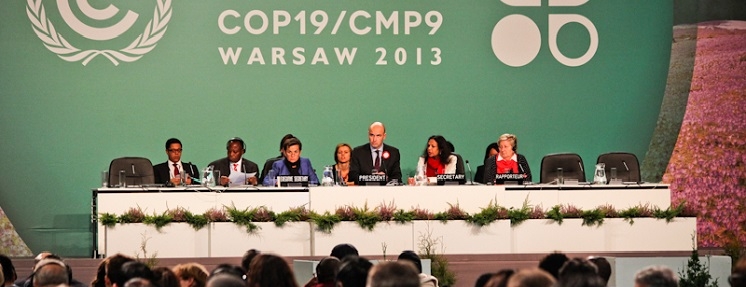
The “Corporate Captured” COP
They say history never repeats itself, but a year ago at the United Nations climate talks in Doha, a typhoon hit the Philippines, killing hundreds of people and leaving an estimated quarter of million people homeless.
 They say history never repeats itself, but a year ago at the United Nations climate talks in Doha, a typhoon hit the Philippines, killing hundreds of people and leaving an estimated quarter of million people homeless.
They say history never repeats itself, but a year ago at the United Nations climate talks in Doha, a typhoon hit the Philippines, killing hundreds of people and leaving an estimated quarter of million people homeless.
These climate talks are known in short as COPs.
At the time, Yeb Saño, a member of the Philippines Climate Change Commission, broke down while calling on negotiators to do more. “Please let 2012 be remembered as the year the world found the courage to take responsibility for the future we want. I ask of all of us here, if not us, then who? If not now, then when? If not here, then where?”
But, in the year since, precious little has changed and there is little urgency for meaningful climate action.
You would have thought that the world would be galvanized to act after the much bigger and more devastating typhoon Haiyan ripped through the Philippines, killing in excess of 10,000 people.
Enter Yeb Saño again, who is now Philippine Climate Change Commissioner. Yesterday, he made an even more impassioned call for action to fight climate change, bringing many delegates to tears.
He had an especially brutal message to the climate deniers and dared them “to go to the islands of the Pacific, the Caribbean, the Indian ocean and see the impacts of rising sea levels; to the mountainous regions of the Himalayas and the Andes to see communities confronting glacial floods, to the Arctic where communities grapple with the fast dwindling sea ice caps, to the large deltas of the Mekong, the Ganges, the Amazon, the Nile where lives and livelihoods are drowned, to the hills of Central America that confronts similar monstrous hurricanes, to the vast savannas of Africa where climate change has likewise become a matter of life and death as food and water become scarce.”
Saño then said that in solidarity with those suffering in his country he would go on hunger strike for the remainder of the COP. He urged delegates to find a solution: “What my country is going through as a result of this extreme climate event is madness. The climate crisis is madness. We can stop this madness. Right here in Warsaw.”
But the chances of this happening remain a pipe-dream. The madness looks set to continue.
There will be no radical international action at this summit. In fact the reverse. There were tell-tail signs yesterday. Climate activists showing solidarity with the Filipinos were evicted. As one activist blogged yesterday: “In the wake of this tragic disaster, it is surprising that the UNFCCC would attempt to silence voices of solidarity”.
The reality is that no one is really expecting much headway to be made at these talks.
First of all there is the problem with the host nation. As the research organisation, Corporate Europe Observatory (CEO) points out: “Poland’s government is renowned for its pro-coal, anti-climate stance. It is now infamous, together with other EU member states, for its blocking of more ambitious EU climate and energy policy.”
Ironically these climate talks in Poland are the first also to have corporate sponsorship, with “some of the biggest climate crooks as official ‘partners’, including ArcelorMittal, Alstom and BMW”, according to CEO.
The Polish Ministry of Economy has even teamed up with the World Coal Association to put on a parallel “International Coal and Climate Summit”- that reveals where the Polish government’s priorities lie.
In a devastating critique of the climate talks, CEO concludes that: “All in all, this year’s UN climate talks are set to be the most corporate captured yet, at a time when genuine progress towards real climate action is more vital than ever.”
And so Yeb Saño’s call for action for his people, and for the communities who are on the frontline of climate change, is likely to fall on deaf ears. He ended his talk by saying “In Doha, we asked ‘If not us then who? If not now, then when? If not here, then where?’ but here in Warsaw, we may very well ask these same forthright questions.”
And indeed he should. And one of those is why has the UN allowed these negotiations to become the “most corporate captured ever”, just at the time our need for action is at its most greatest?
